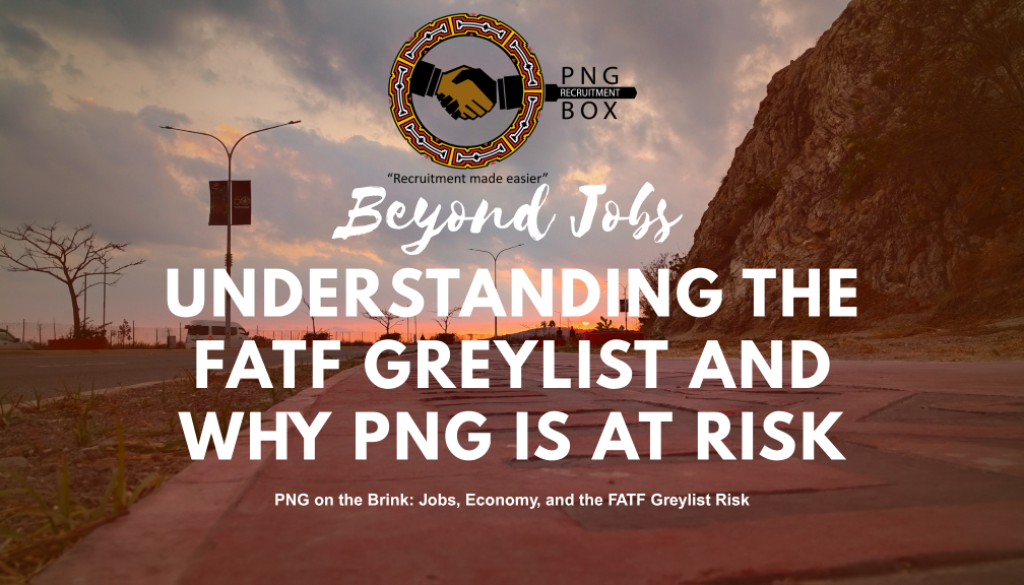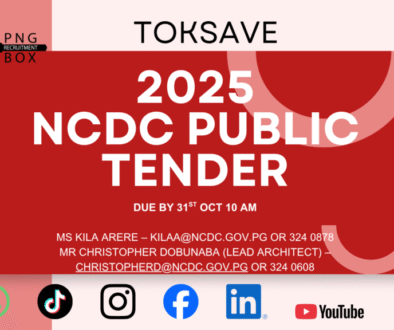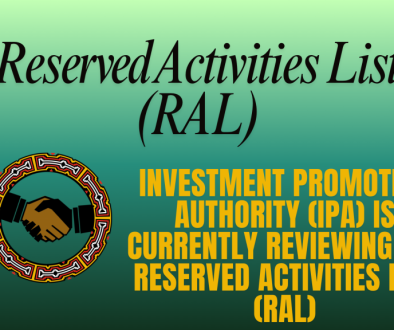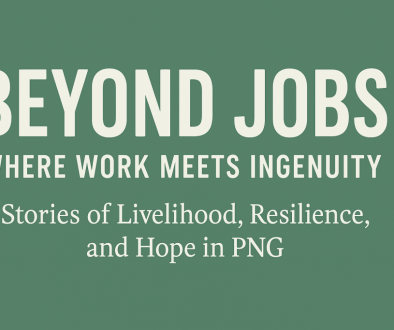Understanding the FATF Greylist and Why PNG Is at Risk
Papua New Guinea’s economy and job market are under the spotlight once again — this time because of the risk of being placed on the Financial Action Task Force (FATF) greylist.
While PNG is not yet greylisted, the Bank of Papua New Guinea (BPNG) has confirmed that the country is under a 12-month observation period which ends in October 2025. Depending on the findings, PNG could be formally greylisted by February 2026 (The National, RNZ).
At PNG Recruitment Box (PNGRB), we believe it’s crucial to explain what greylisting means and why every job seeker, employer, and business leader in PNG should pay attention.
What Is the FATF Greylist?
The Financial Action Task Force (FATF) is a global watchdog that monitors how countries fight money laundering and terrorist financing.
- Countries on the greylist are those with identified weaknesses in their systems but who are actively working with FATF to fix them.
- Being greylisted is not a punishment — but it does signal to banks, investors, and global partners that transactions with that country carry higher risk.
This means foreign businesses and banks tend to apply stricter checks, causing delays, higher costs, and sometimes reluctance to engage.
Why Is PNG at Risk?
In 2023–2024, PNG underwent a Mutual Evaluation Review by FATF’s regional body (Asia-Pacific Group on Money Laundering). The review highlighted several gaps:
- Strong laws, weak enforcement — PNG has laws on paper but struggles with prosecution, follow-through, and recovering illegal assets (Business Advantage PNG).
- Poor coordination — Agencies like police, customs, ICAC, and regulators often work in silos.
- Limited resources — Investigations and prosecutions for financial crimes are under-resourced.
- High-risk sectors — PNG’s dependence on large commodity exports makes oversight complex.
PNG has been here before: the country was greylisted in 2014 and successfully removed from the list in 2016 after reforms. Today, government and financial leaders are again racing against time to avoid that outcome.
What’s Being Done to Prevent Greylisting?
Being greylisted is not a punishment — but it does signal to banks, investors, and global partners that transactions with that country carry higher risk.
The Bank of PNG and the government have already taken steps:
- Created a National Coordinating Committee (NCC) involving 20+ agencies.
- Drafted an Anti-Money Laundering / Counter-Terrorism Financing (AML/CTF) Strategic Implementation Plan.
- Strengthened laws and reporting obligations for banks and businesses.
- Increased cooperation between regulators, law enforcement, and financial institutions.
But FATF’s main concern is not just laws — it’s effectiveness. PNG must show that prosecutions, convictions, and preventative measures are working in practice.
Why This Matters to Jobs and the Economy
While this first article focuses on understanding the greylist, it’s important to note:
- Greylisting affects investment, trade, banking, and business confidence.
- When businesses struggle, job creation slows and hiring becomes more competitive.
- On the other hand, demand for compliance, auditing, and financial crime specialists may grow.
We’ll cover these in depth in Article 2: The Economic Impact of Greylisting on Papua New Guinea.
PNGRB’s Perspective
At PNG Recruitment Box, we are more than a job board — we are a platform that connects talent with opportunity while keeping our community informed about global and national changes that affect the job market.
Greylisting may seem like an abstract financial issue, but its consequences can reshape hiring trends, career pathways, and business growth.
As PNG navigates this risk, PNGRB will continue to provide the insights, guidance, and job opportunities our people need to adapt and thrive.
🔗 Next in this series: The Economic Impact of Greylisting on Papua New Guinea
REMEMBER! When applying for a job, it’s crucial to include a cover letter that clearly outlines your interest in the position and your suitability for the role, along with an updated curriculum vitae. Here are 5 valuable tips on crafting emails that grab attention and get read, as well as advice on structuring your CV to make a strong impression. By following these guidelines, you can enhance your application and increase your chances of landing the job you desire.
Discover more from PNG Recruitment Box
Subscribe to get the latest posts sent to your email.




